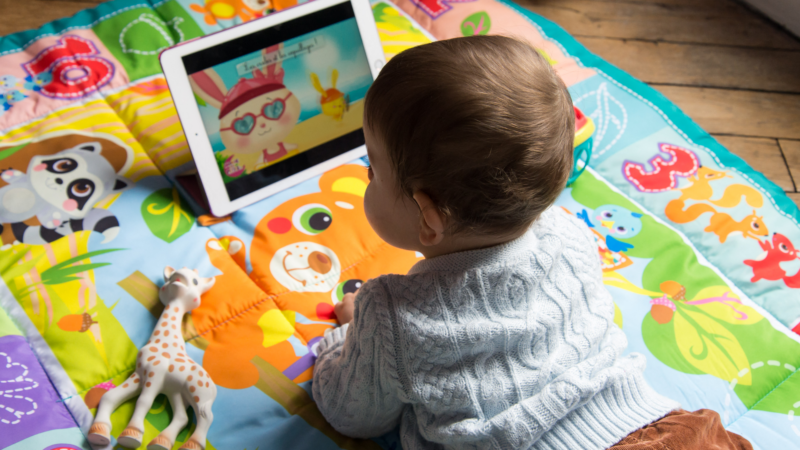Tablets for tots? Survey says kids watch videos on their own devices by age 2
Forty percent of toddlers have their own tablet device by the time they are 2 years old, according to a report released Wednesday by Common Sense Media.
The report looked at media habits in kids 8 years old and younger and measured daily behavior such as time spent looking at screens, what kind of programming kids consumed, and differences in habits depending on gender and socioeconomic status.
The report surveys parents about their children’s media use, and the most significant changes it has found over the last few years were not in the amount of time kids spend on screens, but in the way they consume media and the type of media they consume. Increasingly, children are watching very short form videos on algorithm-driven platforms like TikTok, Instagram Reels and YouTube Shorts.
Sonny Thadani, who lives in New York City and works in tech, has resisted giving his three young kids their own devices. But he and his wife do deploy screens at various times.
“A car ride, an airplane ride, at a busy time at home where you don’t have the support — we rely on technology,” he says.
Thadani says he still struggles with when and how much to let his kids use devices.
“Do we rely on it as parents too much? And is that our first sort of answer? And I think for me, sometimes it is,” he admits. “It’s one of the challenges I have as a father — doing all the things that I want to accomplish personally and professionally.”
Jim Steyer is CEO of Common Sense Media, which is a nonprofit research and advocacy organization. Steyer says while there is no panacea for managing screen time, there are helpful strategies.
“Delay, delay, delay,” says Steyer, referring to when parents should start letting their children use various devices. “Whether it’s a cellphone, a tablet or whatever.”
It’s important, says Steyer, for parents to know what their kids are doing on screens. Many shows, apps and games for young children, he says, are designed to be especially engaging on handheld devices. The more autonomy children have over these devices, the more danger they present, he says.
“Young children now average two-and-a-half hours of daily screen time, predominantly watching short-form video content,” says Steyer.
He advises parents to steer their children towards healthier content, like educational programming, and to watch programs alongside children and discuss the content with them. It’s important, says Steyer, to bring kids into conversations around safety controls and other precautions, such as turning off autoplay.
“ If you go on a device with your child and explore the content with the child, It’s a much more enriching experience for the child and for yourself,” says Steyer.
This was the first year the survey asked questions about artificial intelligence. Nearly one in three young kids now uses AI for learning, which Steyer says presents a unique set of new obstacles since it’s difficult for kids to disentangle what is true or not with information presented to them by AI.
Between 75% and 80% of parents say they are concerned about how their kids are using screens, including worries about what it is doing to their attention spans and mental health.
There’s no doubt screen time is a daunting problem, says Steyer. But the worst thing parents can do is throw up their hands and ignore it.
The report is based on an online survey completed by a representative sample of 1,578 parents of children age 8 and younger; it was conducted in August 2024.
Raising ethics questions, top Trump meme coin investors to dine with president tonight
President Trump is hosting an exclusive dinner tonight for the largest investors in the $TRUMP meme coin, putting the murky world of cryptocurrencies on a collision course with White House ethics.
How Trump made a 30% tariff feel like a relief
It's a pattern in President Trump's chaotic tariff policy: he first suggests a high number, only to later ratchet it down. Business schools call it the 'anchor effect.'
A Newark air traffic controller on how it felt when systems went dark
An air traffic controller who works the airspace around Newark, N.J. speaks out about what it was like to lose radar and communication systems during a shift, and how the situation got to be so bad.
New Orleans Archdiocese agrees to pay nearly $180M to victims of clergy sexual abuse
Lawyers for survivors said they won't support the agreement, which they say was negotiated behind closed doors.
2 Israeli Embassy staff are killed in a shooting in Washington, D.C., officials say
As attendees departed an event held by a Jewish advocacy organization in D.C. on Wednesday night, a shooter opened fire, killing two. Later, he chanted "free Palestine," D.C. police officials said.
Trump tried to shutter Radio Free Europe. The EU threw it a lifeline
EU officials say the broadcaster for years has played an important role providing news to areas where the press can't operate freely









